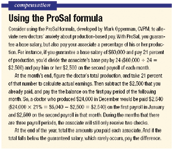Bridge the gap for new grads
Offering to put them in contact with a financial planner may just be the ticket for some new grads.
Some veterinary hospitals seem to find new associates easily and others don't. Wondering why, I went straight to the source. I asked the senior veterinary students at the University of Florida to tell me what they thought their greatest challenges and concerns would be after they graduated. I was somewhat surprised by their responses.

Many students were concerned about their medical and surgical abilities. One student wrote, "My biggest concern is that I won't know what I'm doing once I'm in practice. I'm not confident in my medical and surgical knowledge." Another student was a little more succinct and simply said, "My No. 1 concern is killing a patient."
These are understandable concerns, and I'm sure almost every student has similar issues. However, I didn't let these students stop with the easy answers. And when I asked them to give my question some more consideration, they raised these concerns:
- "I'm afraid of being taken advantage of by my employer financially—working extra without fair compensation, not getting a bonus, if promised, or other contract deals."
- "I'm worried I won't be given the opportunity to implement changes. Will the 'old school' listen?"
- "Becoming and portraying myself as a competent veterinarian"
- "Negotiating a fair contract"
- "Business and money management"
- "My biggest concern is being treated fairly by my boss."
- "Compensation for performance"
- "The biggest challenge we're going to face once in practice: Lack of mentoring!"
Clearly, students feel a great deal of apprehension and suffer a lack of confidence. But there were also students who said, "My No. 1 concern is time efficiency and financial productivity for myself and the practice." In my book, that shows great awareness of the business issues practices face.
I think these concerns present an opportunity for practices seeking a new associate. If you know what someone wants, then hopefully you can meet those needs and develop a successful relationship.
Offer mentoring
It seems to me what most new graduates want is a mentoring environment. They're afraid they'll be thrown into a practice to sink or swim on their own. They don't have the confidence to walk out of school and just start practicing medicine and surgery. In fact, one student told me that her worst fear is she'll be hired by a veterinary practice and the doctor will go on vacation the following week and leave her all by herself.

Associate know-how: 5 things to make your first year great
I think you can learn from this feedback and make your practice a better place for new graduates. For instance, develop a formal mentoring program. You might have a three- or four-week program where you gradually introduce new associates to the practice and explain your policies and procedures. Follow up that orientation program by assigning one of your experienced doctors to the new associate so he or she will have someone to talk to about any questions or problems.
Develop a clear employment contract
New graduates also worry that their boss will take advantage of them. It's an understandable concern, and to help alleviate it, develop an employment contract that spells out all of their responsibilities and the benefits of employment.
If you prepare a fair contract, new graduates will likely feel more secure—and won't feel taken advantage of. And you might also suggest that they hire a contract lawyer who'll review the document and provide feedback.
Consider new compensation options
One student wrote, "The thing I'm most concerned about is being able to pay back loans, buy a house, start a family, and start a savings account." And with debt load averaging more than $80,000, new graduates should be concerned about their compensation.
I recommend paying associates using a combination of a guaranteed salary and payment based on a percentage of production—known as the ProSal approach. For example, you might offer a compensation package that includes a guaranteed base of $60,000 and pay the associate 21 percent of his or her production. With this approach, the associate would earn at least $60,000 but also has the added incentive to make more.
When they're given a choice, students almost always choose the ProSal method—and why not? It's a win-win situation. If they make more than $60,000, that means the practice is making more as well. (For more, see "Using the ProSal Formula".)

Compensation: Using the ProSal formula
Of course, salary is only part of the compensation package. You need to discuss and define other benefits in the employment contract, such as vacation, health insurance, personal leave, continuing education, dues, licenses, and so on.
Sharing average production figures from other doctors in the practice, average doctor per client transactions, and number of invoices also might help to allay a candidate's worries about how much he or she will earn. If the new graduate's interested, you might even choose to review some basic financial indicators for the practice, including new clients, total number of active clients, per client transaction, and so on.
Students are also concerned about their ability to repay debt. Although I believe that the veterinary schools have an important responsibility to counsel students about this, an informed future employer may also lend a helping hand. Offering to put them in contact with a financial planner may be just the ticket for some new grads.
Many corporate-owned veterinary practices are also offering to help associates repay student debt after a certain length of employment, and there's no reason why a private practice couldn't take the same approach. In fact, help paying off student debt is a great incentive for a new associate to take a job with a practice and stay. So think about working this into your compensation agreement.
Offer a healthy management structure
"I never want to join a practice like the one I worked in before veterinary school," said one student. "It was very poorly managed—in fact, it wasn't managed at all. The employees did whatever they wanted, and the owner didn't have a clue." New graduates are looking for practices that have an effective management structure in place.
Do you have a practice manager or a hospital administrator? Have you developed written polices, protocols, and procedures to help guide your team? Many new graduates are concerned about standards of care. For example, what's your vaccination policy? Do you require an annual heartworm check? Do you require preanesthetic blood workups?
You see what I mean; students are concerned that they'll be placed in a situation where they're asked or forced to do something they don't agree with medically. Putting your policies in writing and discussing these topics with potential new associates could help you avoid a number of problems and aggravation.
Along the same lines, do you have a written job description for associate veterinarians? Do you have a written orientation program or a phased-training program?
New graduates wish to walk into an organized and well-managed practice environment, and these tools can help you achieve that goal. Of course, make sure applicants know what to expect if they accept a position with your team.
Offer doctors balance
Naturally new grads are also concerned about the hours they'll be asked to work, emergency coverage, length of appointment time, amount of time scheduled for surgery, and other scheduling issues. I think it's fair to say that most of them aren't willing to work 50- or 60-hour weeks and be on call every week or even every-other week. This is a difference from their predecessors, who did indeed work those hours.
New graduates are looking for quality of life, and they feel they deserve it. As one typical student says, "I'm not going to do what my father did; he worked 60- plus hours a week. I never got to see him; my sister never got to see him. I want to be a part of my children's lives!"
I, for one, agree with this thinking. I think that it's unrealistic to expect new graduates to work 50 or 60 hours a week and emergencies. But I believe it is realistic to expect them to work a good 40 or 50 hours a week. We all need to find ways to balance our personal and professional lives. Understanding this goal and helping new graduates achieve it could go a long way toward developing long-term, successful relationships.
Position your practice to attract new talent
Here's the bottom line: Given the competition out there for associates, you should think about what you can do to become the kind of employer a young doctor most wants to work for. And then let new graduates know you're out there and you have what they want.
Let's say you place an ad for employment that says you offer a formal mentoring program or a three- or four-week orientation program. Do you think that will affect the number and quality of applicants?
You've probably already discovered that the employment environment today is very different than it was a few years ago. Often practices struggle to attract that talented young associate. And that's why it's so important to know what it is that new graduates are looking for and what their concerns are. Once you're armed with this knowledge, you can create an environment that's more conducive to their needs, set aside some of their biggest apprehensions, and find ways to maintain long-term relationships with them.
The bottom line
If you're finding it difficult to attract new graduates, try to see your practice from their perspective, and institute programs or protocols to alleviate their key concerns. For instance:
- create a strong mentoring program,
- make sure contracts are comprehensive,
- consider helping repay student debt, and
- make sure all expectations are clear.

Mark Opperman
Veterinary Economics Hospital Management Editor Mark Opperman is a certified veterinary practice manager and owner of VMC Inc., a veterinary consulting firm based in Evergreen, Colo. Send your comments to ve@advanstar.com